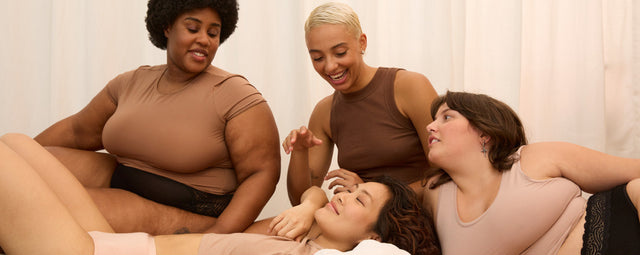After this year’s World Menopause Month, I’m here to unpack one of life’s biggest transitions: from reproductive life to a life with no periods.
Menopause is different for everyone: some breeze through, while others swelter in their own personal sauna. Hot flushes, night sweats, mood swings, and fatigue are just a few of the commonly reported battles, so how can we manage it?
Why does Menopause cause hot flushes?
Hot flushes are up there as one of the most frustrating symptoms for women during perimenopausal phase (also referred to as the ‘menopause transition’). Most struggle with overactive armpit sweat, regular perspiration beads that collect on your brow – not to mention, your butt-crack is never quite feeling dry.
But the reason behind these hot flushes remains unknown. Many hypothesise there is a link between your body's thermoregulation and fluctuating hormones. Although not entirely understood, there’s a consensus that falling estrogen levels may affect a part of the brain called the ‘hypothalamus’ which controls temperature regulation. The hypothalamus tries to compensate but the fluctuations cause confusion and temperature deregulation (hot flushes). It is then likely that the body (sensing this heat), begins to sweat, to try and cool our system back down again.
Are night sweats a sign of anything serious?
Night sweats don’t just occur during menopause, in fact any shift in your hormones or internal thermal regulation can cause fluctuating increases in your body temperature — pregnancy, post-partum, and ovulation have all been linked.
While night sweats can usually be an annoying sleep breaker, they can also be a sign of a more serious underlying health concern. It’s always best to mention any night sweats you experience to your family doctor first, to eliminate any other concerns.

Can you treat hot flushes and night sweats?
Yes, you can! In fact, there’s lots of ways to manage night sweats and hot flushes but remember: menopause is different for everyone — what may work for you, may not work for somebody else, so be prepared to share, research, and try new things.
If you are experiencing debilitating symptoms, it’s always best to see your family doctor first, who can discuss all your options.
Meanwhile, in the short term, there are several ways you can manage fluctuating temperatures, starting with lifestyle changes such as: exercise (particularly strength training for your bones), meditation, healthier eating, leak-proof underwear, like Modibodi and keeping a jumper, or pair of shorts handy.
If you’ve already exhausted those avenues, prescription medication may be a good option for you. There are non-hormonal medications like Clonidine, a blood pressure medication known to also reduce hot flushes, Hormonal Replacement Therapy (HRT) which replaces estrogen if you have had a hysterectomy, or combined with Progestogen Replacement (if you still have your womb). These medications require a prescription, so consult with your GP first to ensure you don’t have any contraindications to taking the medicine.
Lastly, it’s also a great idea to consider seeing a gynaecologist who specialises in menopause. There are lots of different variables that need consideration in order to find the safest and most effective plan for you.
Are there any at-home remedies to treat menopause?
Menopause manifests in a broad range of physical changes, like loss of bone mineral density and decreased muscle mass, putting women at a higher risk of bony fractures, injury, and increased urinary incontinence due to a weakened pelvic floor.
All of this makes at-home exercises increasingly important, particularly weight baring exercise. You don't need be pumping iron for hours at a time, but incorporating some regular body weight exercises like squats, wall holds, push-ups and at least 10 minutes of pelvic floor lifts, can make the world of difference to your mood, pain, and body.
Another great, well-known remedy is sex. It’s basically a gym workout all wrapped up in double the endorphins and oxytocin. And it works solo...
In conclusion...
Menopause can be a taxing and even confronting time to navigate. While our experiences vary, don’t be afraid to seek the support of your doctors, friends, and family. Not sure if you’ve entered menopause yet? You might be experiencing perimenopause, which you can learn more about here.








